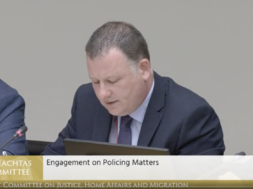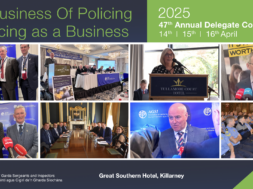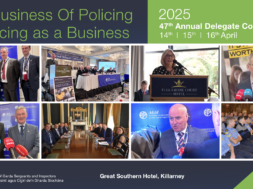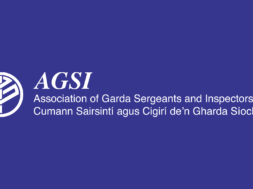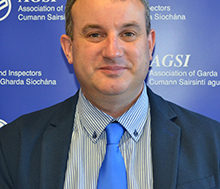
Tánaiste announces membership and final terms of reference of Commission on the Future of Policing in Ireland
16 May 2017
The Tánaiste and Minister for Justice and Equality, Ms Frances Fitzgerald TD, has today announced the membership of the Commission on the Future of Policing in Ireland.
The chair of the Commission, as agreed by Government on 9 May 2017, will be Ms Kathleen O’Toole. The other members will be Ms Noeleen Blackwell, Mr Conor Brady, Dr Johnny Connolly, Dr Vicky Conway, Mr Tim Dalton, Sir Peter Fahy, Dr Eddie Molloy, Ms Tonita Murray, Dr Antonio Oftelie, Professor Donncha O’Connell, and Ms Helen Ryan.
Crucially the Commission may bring forward immediate proposals and rolling recommendations for implementation, that it considers are required to be addressed in the short-term, in advance of its final report.
Speaking following today’s Government meeting, where the final terms of reference for the Commission were also approved, the Tánaiste said: “These terms of reference for the Commission of the Future of Policing in Ireland encompass all functions carried out by An Garda Síochána including community safety, state security and immigration, and also the full range of bodies that have a role in providing oversight and accountability including the three statutory bodies, but also my Department and the Government. They provide for a comprehensive examination of all aspects of policing in Ireland.
“The individuals who make up the Commission have impressive track records in their respective fields. The membership seeks to strike the right balance between domestic and international perspectives and between academic, operational policing, community and victims’ perspectives, change management, governance and indeed Government experience. These are people of the highest calibre and will bring the necessary diversity of thought and expertise to the task.
“Issues which have arisen – many historic, some contemporary – mean the time is right for a fundamental examination of all aspects of policing in this state. This is an opportunity to stand back and examine how we are to be policed as we approach the centenary of the establishment of An Garda Síochána. At the same time the crucial work of day-to-day policing and oversight continues.
“This includes an extensive programme of reform underway in An Garda Síochána based on the reports of the Garda Inspectorate and under the independent oversight of the Policing Authority. These reforms, which affect all aspects of the administration and operation of An Garda Síochána, must not be impeded or delayed in any way by the establishment of the Commission.
“I am determined to continue shining a light to uncover bad practices and issues that must be resolved. The establishment of the Policing Authority means that we now have, among other things, an independent body to oversee the implementation of the reform programme in An Garda Síochána and specifically the agreed recommendations of the Inspectorate Report ‘Changing Policing in Ireland’. Since the beginning of this year the independent Authority has been making appointments to senior positions in An Garda Síochána.
“The current reform must continue relentlessly. The work of the oversight bodies must continue and the Government’s support for An Garda Síochána by providing the necessary resources for recruitment and investment will continue.
“It is clear from recent events that systemic issues which have emerged require the establishment of this expert group on policing to report in a timely way on the further changes now necessary to meet the requirements of a modern police force.”
The Tánaiste expressed her appreciation of the willingness on the part of the Chair and the members to become involved in what is a hugely important task that is of relevance to every citizen of the State.
The Commission will report by September 2018.
Notes for editors
Membership of the Commission on the Future of Policing in Ireland
Ms Kathleen O’Toole, Chairperson | Ms Kathleen O’Toole is currently Chief of the Seattle Police Department. She held the position of Chief Inspector of the Garda Inspectorate between 2006 and 2012 prior to which she was the Commissioner of the Boston Police. |
Ms Noeleen Blackwell | Ms Noeleen Blackwell is a human rights lawyer who is Chief Executive of the Dublin Rape Crisis Centre. She was formerly the Director General of the Free Legal Advice Centre (FLAC). |
Mr Conor Brady | Mr Conor Brady is a former editor of the Irish Times and the Sunday Tribune and was a member of the Garda Síochána Ombudsman Commission from 2005 to 2011. He has written extensively on the history of An Garda Síochána and has served as a visiting professor at the John Jay College of Criminal Justice in New York. |
Dr Johnny Connolly | Dr Johnny Connolly is Irish Research Council Enterprise Scholar at the Centre for Crime, Justice and Victim Studies at the School of Law in the University of Limerick. His research project, co-funded by the Irish Research Council and the Irish Council for Civil Liberties, is titled ‘Developing a comprehensive human rights based response to drug and gang-related crime and community violence’. He has previously worked as a Visiting Research Fellow in the School of Social Work and Social Policy at Trinity College Dublin and as a Research Officer at the Alcohol and Drugs Research Unit of the Health Research Board. He has published widely on justice issues and is board member of the Irish Penal Reform Trust. |
Dr Vicky Conway | Dr Vicky Conway is a lecturer in law in the School of Law and Governance in DCU where she teaches criminal law and criminology. She has previously held positions at the University of Kent, Queen’s University Belfast, the University of Limerick and the University of Leeds. Vicky is a graduate of UCC (BCL, LLM), the University of Edinburgh (MSSc Criminology) and Queen’s University Belfast (PhD, PGCert Higher Education). Dr Conway is a leading researcher on policing in Ireland with an emphasis on the intersection between social change, police culture and police accountability. She has published two monographs on policing in Ireland (The Thick Blue Wall: The Morris Tribunal and Police Accountability in the Republic of Ireland and Policing Twentieth Century Ireland: A History of an Garda Síochána), edited a book on criminal procedure and written numerous articles on policing. Her research has been funded by the British Academy and the European Commission. She was appointed a member of the Policing Authority in December 2015. She has held visiting scholar positions in North America, Australia and Ireland. Vicky is a member of the board of the Association of Criminal Justice Research and Development and has previously been a board member of the award winning Committee on the Administration of Justice in Northern Ireland. |
Mr Tim Dalton | Retired Secretary General of the Department of Justice and Equality. |
Sir Peter Fahy QPM., MA | Sir Peter Fahy has served in 5 UK forces spending 5 years as Chief Constable of Cheshire and 8 as Chief Constable of Greater Manchester Police with 13,000 staff under his command. In his time as a police chief he championed Neighbourhood Policing and drove through significant change programmes. For 8 years he was director of the Strategic Command Course at the police staff college Bramshill. He held national positions in charge of race and diversity and workforce development and was national police lead for the Prevent counter terrorism programme. He is a life member of the US Police Executives Research Forum having previously served on their board. When he left policing in November 2015 he took up a post as chief executive of the street children charity Retrak and among other responsibilities works with African police forces on how they deal with vulnerable children. He is also Chair of the Plus Dane Housing Association and a trustee of the Catholic Diocese of Salford along with a number of other trustee positions. He is an honorary professor at the University of Manchester. |
Dr Eddie Molloy | Dr Eddie Molloy is Independent Management Consultant, Director Advanced Organisation. He specialises in strategy, large-scale organisation change and innovation. |
Ms Tonita Murray | Ms Tonita Murray is an international police development consultant with over 40 years as a civilian in government ministries directing the police and in the Royal Canadian Mounted Police (RCMP). She has specialised in police reform, policy development, training, leadership and management. During her career in the RCMP she was one of the leaders of organisational change and a Director General of the Canadian Police College. From 2003 to the present, she has been engaged in police reform in Afghanistan and Kenya, including gender mainstreaming and gender sensitive policing. She has published on police management and reform, accountability and governance, women in policing and on the Afghanistan police reform effort. |
Dr Antonio Oftelie | Dr Antonio M. Oftelie is Executive Director, Leadership for a Networked World and Fellow, Technology and Entrepreneurship Center at Harvard. Dr Oftelie conducts research, teaches, and advises on how law, policy and technology can be aligned to create exceptional environments for organizational innovation and adaptation. Based in the John A. Paulson School of Engineering and Applied Sciences at Harvard University, Antonio administers the Harvard Innovation Award program, is faculty lead for the Public Safety, Health and Human Services, Chief Financial Officer, Next Generation Operations, and Public Sector for the Future summits, and since 2004, has developed and taught in more than forty Harvard executive education programs. As an application of his research, Antonio advises senior government and business executives on organizational transformation by helping them to adapt their mission and strategy, ideate new business and service models, build dynamic capacity, and create performance and value measures. |
Professor Donncha O’Connell | Professor Donncha O’Connell is an Established Professor of Law at the School of Law, NUI Galway where he has just completed a four year term as Head of School. He is also a Commissioner of the Law Reform Commission and was, for four years, a board member of the Legal Aid Board. Professor O’Connell was a Visiting Senior Fellow at the Centre for the Study of Human Rights, London School of Economics in the academic year 2009-2010. From 1999-2002 he was the first full-time Director of the Irish Council for Civil Liberties (ICCL). He has also served on the boards of the following human rights NGOs: INTERIGHTS; Free Legal Advice Centres (FLAC) Ltd; and Amnesty International – Ireland. He was a member of the EU Network of Independent Experts on Fundamental Rights that advised the EU Commission on a wide range of human rights issues from 2002-2007 and, latterly, the Senior Irish member of FRALEX, a legal expert group that advised the EU Agency for Fundamental Rights (FRA) in Vienna from 2007-2010. |
Ms Helen Ryan | Ms Helen Ryan was the Chief Executive Officer of Creganna-Tactx Medical from 2005 – 2013, a global supplier to the medical device industry specialising in products, technologies and solutions for minimally invasive therapies. The company is currently ranked among the world’s top 10 medical device outsource providers. During Ms Ryan’s time as CEO, the company grew five-fold to become the largest indigenous medical device company. The expansion included three company acquisitions, a strategic joint venture in Asia, and the raising of significant debt and equity financing. The organisation grew from 100 people at a single site in Galway to over 1,250 people across a global network of four sites in Ireland, the USA and Singapore. Prior to joining Creganna-Tactx in 2003, Ms Ryan worked with Medtronic and Tyco Healthcare (Covidien) in Product Development and R&D functional management roles. She is a fellow of the Institute of Engineers of Ireland and a member of the Boards of Enterprise Ireland and of the Galway University Foundation. She is a past Chair of the Irish Medical Devices Association, and serves as a non-executive director of a number of companies. |
Commission on the future of Policing in Ireland – Final Terms of Reference
An Garda Síochána, the national police service with responsibility for community safety, state security and immigration, plays a hugely important role in Irish society and has traditionally enjoyed the widespread support of the community it polices. An Garda Síochána has, however, been the subject of significant public controversy over the past decade and continues to be so. Notwithstanding wide-ranging measures taken to address the causes of these controversies, including the establishment of a new oversight framework and the ongoing implementation of a reform programme within An Garda Síochána, concerns remain in relation to the accountability of An Garda Síochána, its leadership and management capacity and its culture and ethos. These concerns have the potential to undermine public confidence in policing and the legitimacy of An Garda Síochána. Additionally, like all police services it faces internal and external challenges rooted in the changing context in which all police services operate in the 21st century. These include increased expectations of transparency, accountability and professionalism, the changing nature of crime, the changing nature of society and the need for pro-active, routine and continuous engagement with local communities.
The people of Ireland are entitled to have a professional and effective police service that they can trust and have confidence in to act not only within the law, but to the ethical standards appropriate to a modern police service; whose leadership and management have the capacity to provide such a service, to meet emerging challenges and to oversee and realise the benefits of ongoing reform initiatives; and that is subject to robust external oversight. To ensure that policing in Ireland continues to meet these expectations and commands the support of the Irish people it is appropriate that a Commission should be appointed to carry out a fundamental review of the role, structures, leadership and management, ethos and culture of policing and existing oversight and consultative arrangements. Such a fundamental review must encompass all functions carried out by An Garda Síochána (including community safety, state security and immigration) and the full range of bodies that have a role in providing oversight and accountability for their activities, including the Police Authority, the Garda Inspectorate, the Garda Síochána Ombudsman Commission, Joint Policing Committees, the Department of Justice and Equality and Government having regard to the need for democratic and political accountability.
The oversight, accountability and related functions of the relevant statutory bodies will continue to be discharged by them during the tenure of the Commission and will represent an essential input into its work. There is an ongoing programme of reform underway based on the Garda Inspectorate reports which are being progressed through the implementation of the Garda Commissioner’s Modernisation and Renewal Programme 2016-2021 and which is being overseen by the Policing Authority. The work of the Commission should not hinder these important developments and it will be open to the Commission, as it sees fit, to address such developments in their Report.
Taking this into account, the Commission will inquire into policing in Ireland and, on the basis of its findings, bring forward to the Government proposals for the future of policing.
Its proposals should address:
· The structures and management arrangements required for the most effective delivery of policing (including all functions currently carried out by An Garda Síochána – community safety, state security and immigration), to ensure
– the most appropriate structures for delivering all aspects of policing are established (whether a unitary structure or otherwise),
– there is appropriate leadership and management capacity to deliver effective and accountable policing,
– that there are adequate management and supervisory systems in place, and
– that information systems appropriate to the needs of a modern police service available.
· The appropriate composition, recruitment and training of personnel, to ensure
– the optimal composition of policing services between sworn officers, unsworn personnel and the Garda reserve,
– the personnel reflect the diversity of Irish society,
– the most appropriate recruitment methods are employed in staffing, and
– appropriate ongoing professional development for all personnel to meet the challenges of modern policing..
· The culture and ethos of policing, to ensure
– the culture of policing is aligned with a clearly articulated ethos that promotes the values and behaviours that should be expected of a modern police service including in relation to the rights of those affected by crime,
– an ethos and culture that values accountability and embraces change, and engages pro-actively, routinely and continuously with, and is responsive to the needs of, the diverse communities it serves, and
– valuable elements of police culture that exist are recognised and maintained.
· The appropriate structures for governance, oversight and accountability, to ensure:
– that policing operates within a clear framework of governance and accountability to the law and the community, that is supported by coherent structures,
– that policing is constrained by, accountable to and acts only within the law;
– that policing powers and procedures, like the law, are clearly established and publicly available;
– that breaches of discipline are effectively and fairly addressed;
– that there are open, accessible and independent means of investigating and adjudicating fairly upon complaints against the police;
– that there are arrangements for accountability and for the effective, efficient and economic use of resources in carrying out all policing functions and delivering policing objectives;
– that there are effective means to ensure independent professional scrutiny of the police services to ensure that proper professional standards are maintained;
· the legislative framework for policing, to ensure that it is adequate to meet the challenges of modern policing.
In carrying out its work, the Commission should have regard to:
· existing and emerging issues identified as key challenges for Ireland’s model of policing, e.g., evolving nature of crime, society (including increasing diversity) and public expectations and their relevance to structures, service delivery models, public confidence, performance measures etc.
· international benchmarks in relation to the delivery of the most effective policing,
· best practices and changes in the policing models of other countries focused towards greater effectiveness and efficiency, and fostering public confidence in policing; and the relevance and applicability of such ideas in Ireland
· previous reports concerning policing in Ireland,
· any specific challenges to delivering consistent structural and cultural reform in policing.
The Commission should consult widely, including with the public and civic society and any other bodies or individuals it considers appropriate.
The Commission will report in September 2018
The Commission may bring forward immediate proposals and rolling recommendations for implementation, that it considers are required to be addressed in the short-term, and in advance of its final report.
The Commission should address in its report(s) the implementation of its recommendations and the mechanisms required to oversee implementation.

